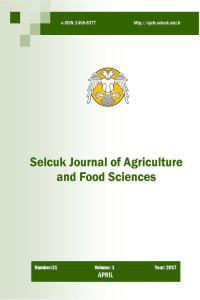Responses of Ricinus communis L. (Castor bean, phytoremediation crop) seedlings to lead (Pb) toxicity in hydroponics
Öz
Lead (Pb) is not essential for metabolism of organisms. Lead toxicity to nervous system in human is well established. It is released into the environment through various technogenic and geogenic sources. Soils are often co-contaminated with potentially toxic metals like lead, cadmium etc. and petroleum and chlorinated hydrocarbons etc. Organics can be degraded to less toxic forms by bioremediation strategies, while inorganics such as Pb, cannot be degraded. Phytoremediation is one of the effective strategies to achieve natural attenuation. Ricinus communis L. (Castor bean, Euphorbiaceae) is a potential candidate for environmental cleanup and revegetation of contaminated lands. Published literature acknowledges its outstanding remediation functions. Additionally, its environmental sustainable aspects and circular economics are attracting researchers in the field of agriculture and environmental sciences. This paper investigates the responses of castor bean seedlings to Pb-toxicity in hydroponics, which offers unique clues for understanding toxicity and tolerance manifestations.
Ayrıntılar
| Birincil Dil | İngilizce |
|---|---|
| Konular | Agronomi |
| Bölüm | Araştırma Makalesi |
| Yazarlar | |
| Yayımlanma Tarihi | 28 Nisan 2017 |
| Gönderilme Tarihi | 17 Mart 2017 |
| Yayımlandığı Sayı | Yıl 2017 Cilt: 31 Sayı: 1 |
Selcuk Journal of Agriculture and Food Sciences Creative Commons Atıf-GayriTicari 4.0 Uluslararası Lisansı (CC BY NC) ile lisanslanmıştır.


